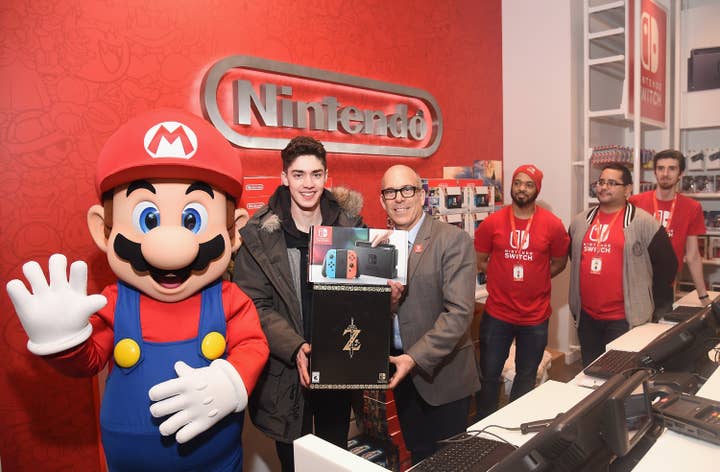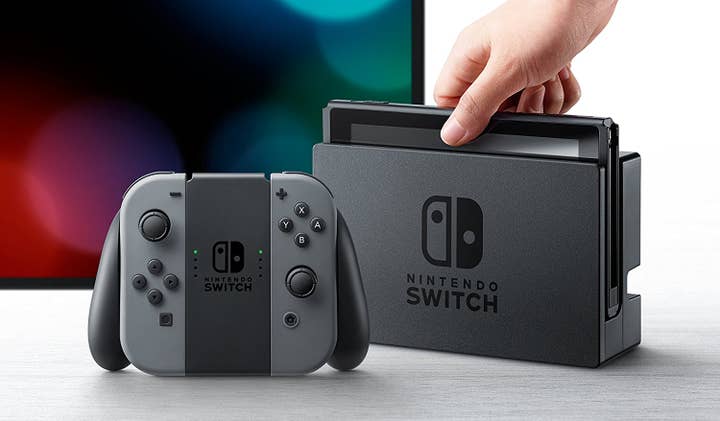Here's why 'deliberate Switch shortages' is a ridiculous notion
Nintendo has regularly said it's ramping up production, so why are people so worried the platform holder is holding out on us?
Headlines have emerged this morning, assuring both the industry and consumers that Nintendo is not purposefully keeping retailers waiting for new Switch stock.
Almost all stem from a single interview on Ars Technica, in which the platform holder's senior director of corporate communications Charlie Scibetta said: "It's definitely not intentional in terms of shorting the market. We're making it as fast as we can."
His words may offer relief to some, but it fuels the unnecessary notion that the Nintendo Switch shortages were ever deliberate - a premise that, at this stage, is somewhat laughable. Perhaps the question ought not to be whether Nintendo is holding back, but why it ever would?
The Switch is perhaps the most crucial console in Nintendo's history. While the company was not haemorrhaging money the way some outlets would have you believe, losses and slashed forecasts have been a regular theme in the platform holder's financial reports over the past few years.
This time last year, Nintendo posted its biggest Q1 loss since 2011 - unwelcome news after the firm's full-year income fell by 60%, as was revealed just a few months prior. The reason was clear: the struggling Wii U was beyond any hope of recovery, and Nintendo was in dire need of the new NX hardware it had been teasing. Moreover, it needed this mysterious console to perform strongly if it were to reverse its financial woes.

Given the pressure, Nintendo was remarkably restrained when it came to unveiling the Switch. The console was completely absent from E3 2016, with only a three-minute teaser in October before its full reveal in January - less than two months before the game launched worldwide.
Opinion was divided, particularly after that initial teaser, and the run-up to launch felt oddly muted - even a week before. Analysts struggled to agree on how well the Switch would perform, with estimates ranging from between shipments of 10m to just 4.4m for its first full-year. As Rob Fahey put it on the day of launch, Switch was launching into a storm of confused expectations.
Given this ambiguous industry response and the lingering disappointment of the Wii U, perhaps Nintendo deliberately avoided manufacturing too many Switches for launch. It's understandable - the new device was undeniably a risk, if only because both of Sony's past attempts to marry the worlds of console and handhelds with PSP and Vita had famously struggled. You could forgive Nintendo for being worried.
And then it arrived.
Instantly, Switch was a hit with consumers, critics and retailers and within a week it was firmly established as the fastest-selling Nintendo console of all time (in terms of opening weekend sales). By the end of its first month, there were more than 2.74m units in consumers' hands with 5.46m games sold (half of which were Zelda: Breath of the Wild).
Perhaps it's worth noting at this point that Switch is actually selling slower than the Wii U at the moment. Wii U had sold 3.06m consoles within the first month, and 11.69m games - but it's not hard to imagine Switch besting this if stock hadn't dried up almost immediately after launch.
Throughout March, retailers began offering updates on when they were expecting new shipments, with Nintendo responding rapidly - and it's here that the misconception of deliberate shortages should be addressed.

Just two weeks after the Switch launched, Nintendo reported it was doubling the console's production in order to meet demand, hoping to deliver 16m units into the channel by the end of the financial year (with expectations to sell 10m of them).
As recently as May, the platform holder revealed it was significantly upping production again, now reportedly aiming for 18m units by March 2018. These efforts, however, might have been hindered by reported competition with mobile manufacturers such as Apple as Nintendo fights to get hold of the required components - further evidence that any shortages will be far from deliberate.
It's interesting to note that 18m units is higher than the 14m units planned for the Wii's first fiscal year, lending credence to claims that Switch could match or surpass the previous console in terms of sales. The 14m estimate followed a similar increase in production, and even back then Nintendo faced claims of intentionally slowing down supply.
There's even the suggestion that Nintendo discontinued the NES Classic in order to free up manufacturing operations to help produce more Switch consoles - although there is little to no evidence to prove this has had a genuine impact on the platform holder's output.

Deliberately holding back the supply of Switch units serves no purpose for Nintendo. There are some that will argue it helps to artificially boost demand - but the demand is already there.
First-party titles such as Zelda and Mario Kart have received rave reviews from critics, with the former declared a much-needed reinvention for a series that seemed to be losing some of its prestige. Early previews of Splatoon and Arms read well, with coverage generated by multiplayer beta tests creating further hype. Even the upcoming Mario + Rabbids Kingdom Battle - widely scoffed at when leaked a month ago - has turned heads with a well-received E3 showing.
In fact, Nintendo has a significant first-party release coming to Switch every month between now and January - not least of which is Super Mario Odyssey, which attained multiple Game of the Show awards last week and stands to be a promising system seller.
Granted, Nintendo may prefer that the bulk of units are on shelves in time for Mario, Q4 and Switch's all-important first Christmas, but what's the sense in releasing regular first-party titles - more than it did for the launch years of Wii U and 3DS - if it only intends to sell them to the established early adopters? At this crucial stage of a console's life, every release is intended to sell the device to some extent, even if it's only to a few more consumers.
Having increased production twice, engaged in a components battle with giants like Apple, and readied the most impressive first-year line-up a Nintendo console has seen in several generations, it's safe to say the platform holder has no reason to strategically stifle supply. If anything, the company is paying the price for exercising some (admittedly, then-needed) caution when its latest phenomenon was preparing for launch.
